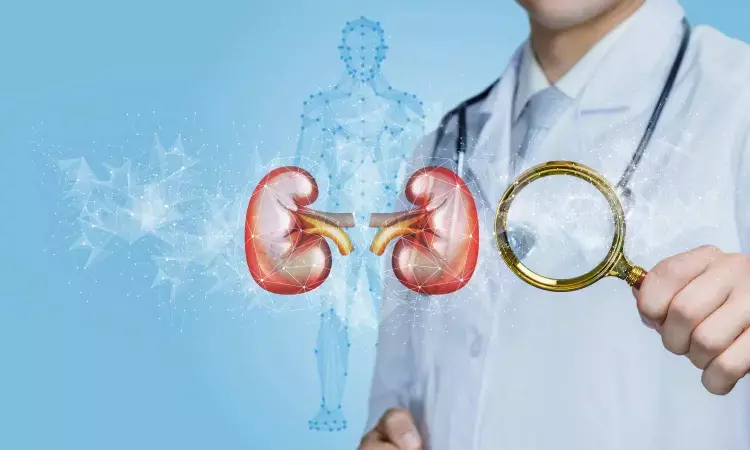- Home
- Medical news & Guidelines
- Anesthesiology
- Cardiology and CTVS
- Critical Care
- Dentistry
- Dermatology
- Diabetes and Endocrinology
- ENT
- Gastroenterology
- Medicine
- Nephrology
- Neurology
- Obstretics-Gynaecology
- Oncology
- Ophthalmology
- Orthopaedics
- Pediatrics-Neonatology
- Psychiatry
- Pulmonology
- Radiology
- Surgery
- Urology
- Laboratory Medicine
- Diet
- Nursing
- Paramedical
- Physiotherapy
- Health news
- Fact Check
- Bone Health Fact Check
- Brain Health Fact Check
- Cancer Related Fact Check
- Child Care Fact Check
- Dental and oral health fact check
- Diabetes and metabolic health fact check
- Diet and Nutrition Fact Check
- Eye and ENT Care Fact Check
- Fitness fact check
- Gut health fact check
- Heart health fact check
- Kidney health fact check
- Medical education fact check
- Men's health fact check
- Respiratory fact check
- Skin and hair care fact check
- Vaccine and Immunization fact check
- Women's health fact check
- AYUSH
- State News
- Andaman and Nicobar Islands
- Andhra Pradesh
- Arunachal Pradesh
- Assam
- Bihar
- Chandigarh
- Chattisgarh
- Dadra and Nagar Haveli
- Daman and Diu
- Delhi
- Goa
- Gujarat
- Haryana
- Himachal Pradesh
- Jammu & Kashmir
- Jharkhand
- Karnataka
- Kerala
- Ladakh
- Lakshadweep
- Madhya Pradesh
- Maharashtra
- Manipur
- Meghalaya
- Mizoram
- Nagaland
- Odisha
- Puducherry
- Punjab
- Rajasthan
- Sikkim
- Tamil Nadu
- Telangana
- Tripura
- Uttar Pradesh
- Uttrakhand
- West Bengal
- Medical Education
- Industry
Low Serum Uromodulin Levels Linked to Diabetic Kidney Disease, finds study

Researchers have discovered a significant association of low serum levels of uromodulin with diabetic kidney disease (DKD), meaning it could be a predictive marker for the disease. A recent study was published in the journal of BMC Nephrology conducted by Shaimaa and colleagues.
This meta-analysis was based on the PRISMA protocol; systematically reviewed data from PubMed, Cochrane Library, Web of Science, and Scopus; and consisted of six studies which met the inclusion criteria by examining the relationship between serum uromodulin levels and DKD. The standardized mean difference (SMD) with a 95% confidence interval (CI) was applied to evaluate the association. Heterogeneity was determined using the I² statistic with a threshold of 50% for significant heterogeneity. Sensitivity and subgroup analyses were performed to explore the sources of heterogeneity, and quality of studies was evaluated using the Newcastle-Ottawa Scale (NOS). Publication bias was assessed by funnel plots and Egger's test.
In total, 1,774 patients were included in the meta-analysis. Pooled results are presented below:
Low Levels of Uromodulin: Serum uromodulin levels were found to be significantly lower in patients with DKD (SMD: -0.31; 95% CI: -0.48 to -0.13; I² = 45%).
Sensitivity Analysis: After sensitivity, results were still significant, and the heterogeneity was lost due to adjustment (SMD:-0.38; 95% CI:-0.49 to -0.27; I²=3%).
Regional Analysis: The subgroup analyses proved that the uromodulin levels were reduced significantly by uromodulin levels throughout various regions.
• America: SMD:-0.34(95% CI:-0.51 to -0.17; p<0.0001)
• Asia: SMD: -0.63(95% CI: -1.15 to -0.11; p=0.02).
• Europe: SMD:-0.54(95% CI:-1.06 to -0.02;p=0.04)
• Diabetes Types: Results found to be significant for the following diabetes types.
• Type 1 diabetes: SMD: -0.34 (95% CI: -0.51 to -0.17; p <0.0001).
• Type 2 diabetes: SMD: -0.58 (95% CI: -0.95 to -0.22; p=0.002).
This meta-analysis confirmed that low serum uromodulin levels are significantly associated with DKD, and it may have the potential as a predictive biomarker. However, further studies are necessary to refine its diagnostic accuracy and explore its implications in diverse populations and clinical settings.
Reference:
Barr, S. I., Abd El-Azeem, E. M., Bessa, S. S., & Mohamed, T. M. (2024). Association of serum uromodulin with diabetic kidney disease: a systematic review and meta-analysis. BMC Nephrology, 25(1).https://doi.org/10.1186/s12882-024-03854-x
Dr Riya Dave has completed dentistry from Gujarat University in 2022. She is a dentist and accomplished medical and scientific writer known for her commitment to bridging the gap between clinical expertise and accessible healthcare information. She has been actively involved in writing blogs related to health and wellness.
Dr Kamal Kant Kohli-MBBS, DTCD- a chest specialist with more than 30 years of practice and a flair for writing clinical articles, Dr Kamal Kant Kohli joined Medical Dialogues as a Chief Editor of Medical News. Besides writing articles, as an editor, he proofreads and verifies all the medical content published on Medical Dialogues including those coming from journals, studies,medical conferences,guidelines etc. Email: drkohli@medicaldialogues.in. Contact no. 011-43720751


